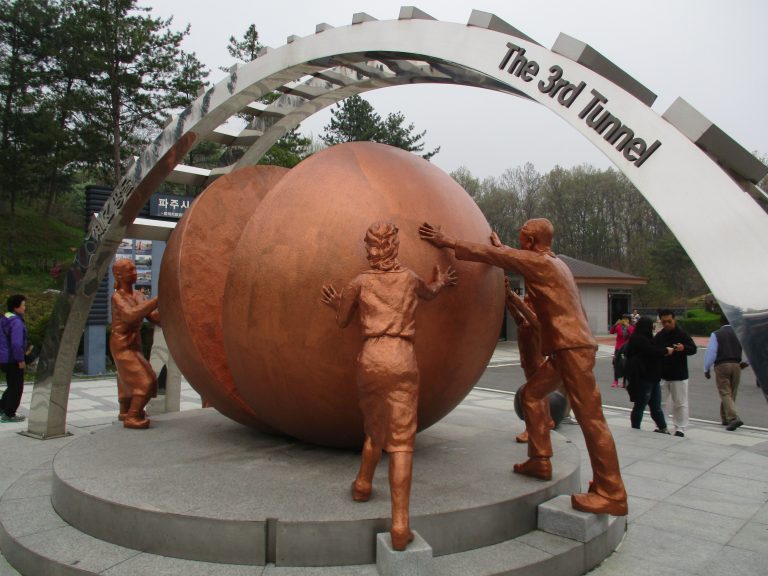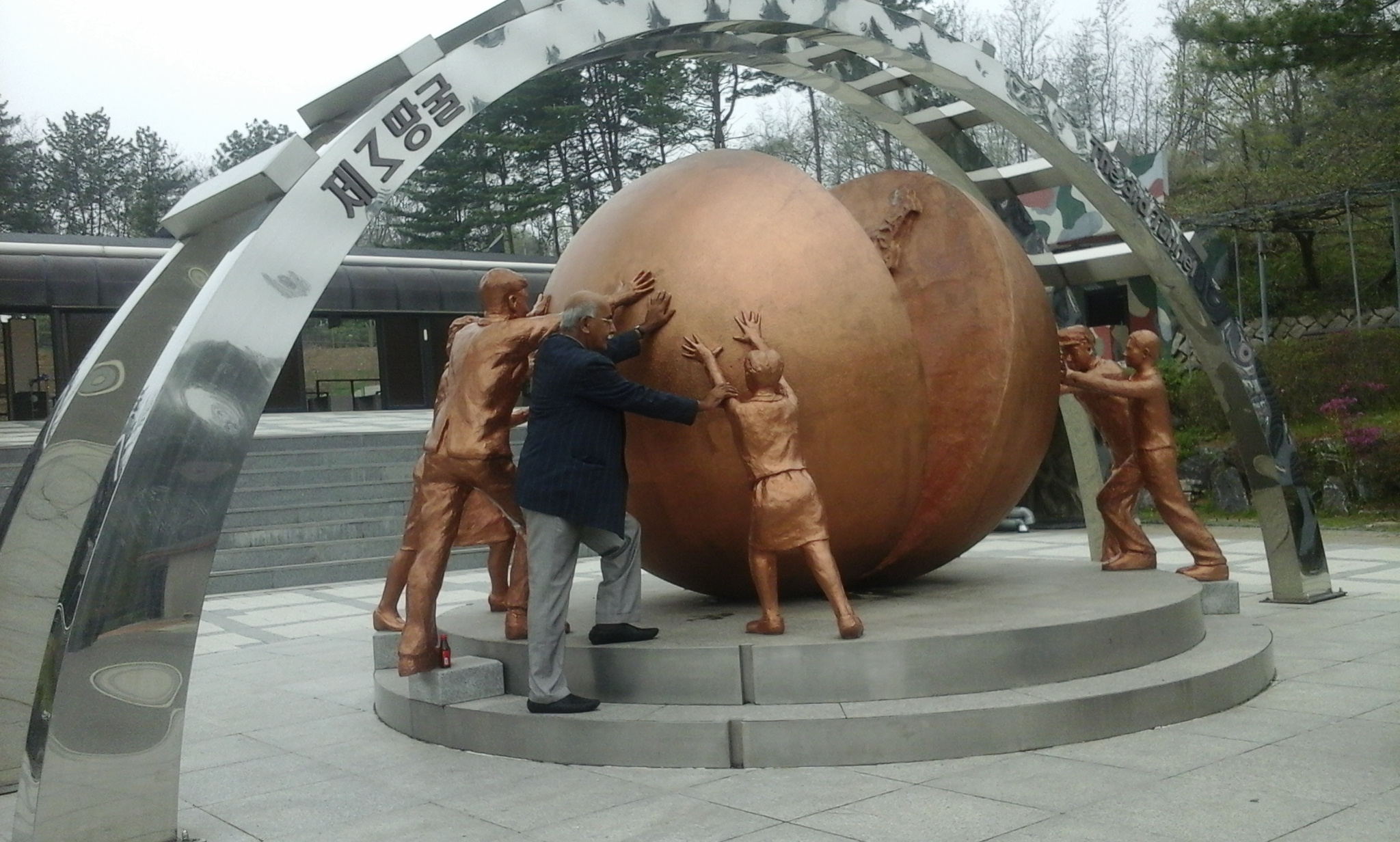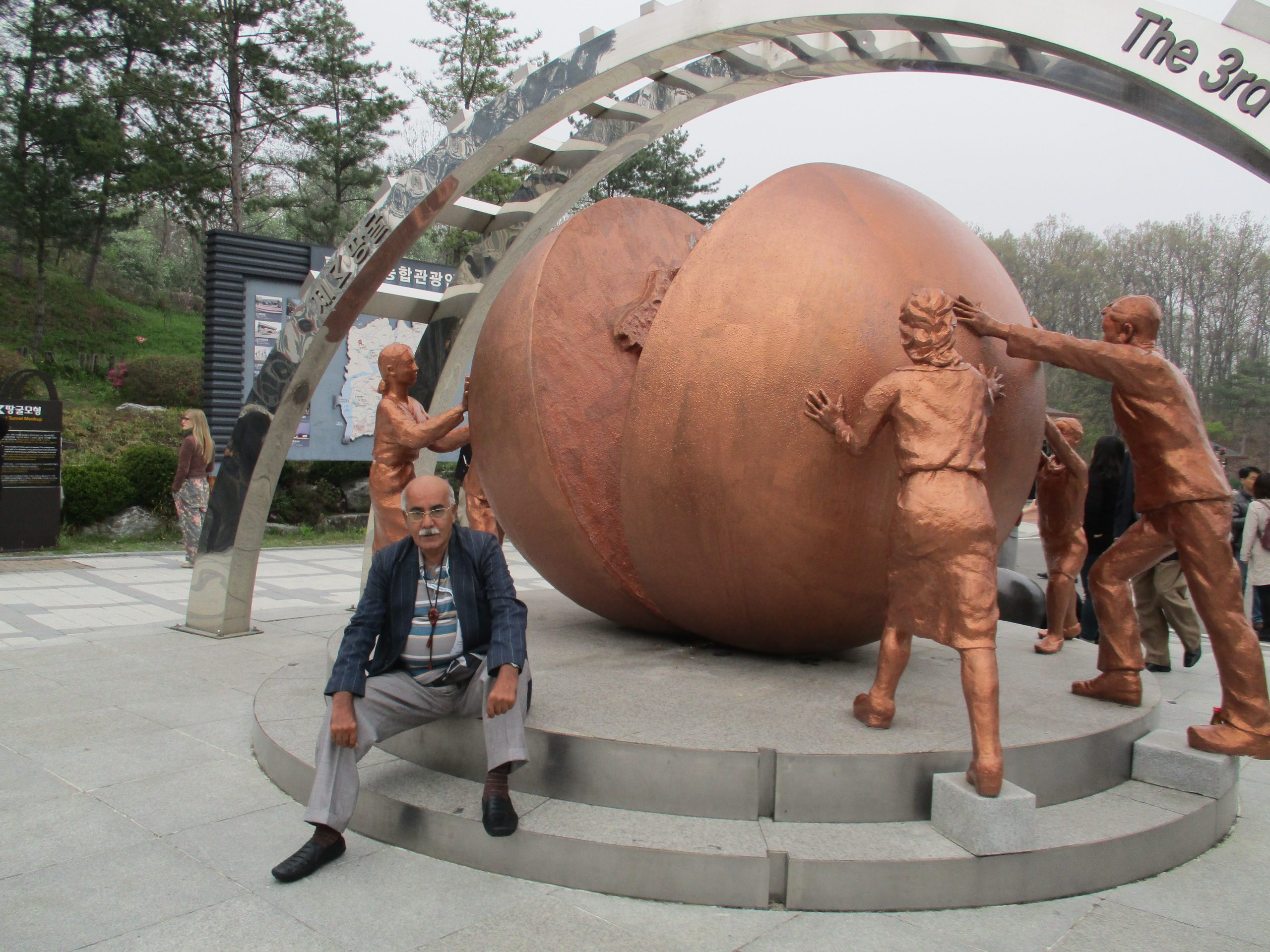
I visualize the peace-loving people of the world exerting pressure for reunification of Korea as depicted in a symbol placed at the venue of 3rd Tunnel in DMZ showing Korean people pushing two parts of their country for reunification.
By Nasir Aijaz
Standing at the observatory atop a hill in demilitarized zone (DMZ) between South and North Korea, I gazed towards northern part of Korean peninsula, covered with thick fog and was thus invisible. “The mist has enveloped not only the beautiful landscape but also the hearts and minds of rulers of North Korea and certain other ‘forces’ hindering the process of peace and unification of divided country,” I thought recalling the reports of nuclear test by the North Korean regime that proves true an old saying that ‘man, not weapons, makes the war’.
I was among the 80 delegates from over 50 countries of Asia, Europe, Africa, Middle East, Far East and Australia, representing the world media, visiting the DMZ on April 22, 2016, the last day of week-long ‘Journalists Forum for World Peace 2016 (JFWP 2016)’ organized by Journalists’ Association of Korea (JAK).
The journalists from all around the world witnessed the artificial borders of divided nation, and unanimously passed a resolution reaffirming the importance of world peace and denuclearization of Korean Peninsula. Korea remains the world’s only divided country since the truce taking place 63-years back after Korean War in 1953. Despite ceasefire, a tense situation prevailed over the Korean Peninsula for over six decades.
 Although, as a result of the summit talks in the year 2000 and 2007 and various dialogue channels, the South and North Korea had agreed to pursue a peaceful co-existence and shared prosperity, raising the hopes of reconciliation and easing the tension between them besides reunion of divided families, the North Korea continued its nuclear program, gravely undermining the hopes to see peaceful reunification of the Korean Peninsula. The continued nuclear program of the North Korea, and especially the recent nuclear test, fourth in its series, in fact, was not only a threat to the world peace but a threat to the détente that had developed after untiring diplomatic efforts at world level.
Although, as a result of the summit talks in the year 2000 and 2007 and various dialogue channels, the South and North Korea had agreed to pursue a peaceful co-existence and shared prosperity, raising the hopes of reconciliation and easing the tension between them besides reunion of divided families, the North Korea continued its nuclear program, gravely undermining the hopes to see peaceful reunification of the Korean Peninsula. The continued nuclear program of the North Korea, and especially the recent nuclear test, fourth in its series, in fact, was not only a threat to the world peace but a threat to the détente that had developed after untiring diplomatic efforts at world level.
The world media representatives, hailing from different nations, gender, religion and ideology, pledged on this occasion to create a free and peaceful community, and fulfill their responsibility as journalists to bring out the truth.
While returning from DMZ, I hoped the resolution passed by the journalists would prove to be a strong message to the world for accelerating the efforts aimed at restoring peace and paving the way for unification of divided Korean nation.
I had visited DMZ first in 2008 at the invitation of Asia Journalists’ Association (AJA) and was among several signatories of ‘Peace Declaration’ passed at the stairs of observatory atop the PAJU hill. Almost eight years have passed but the situation remains unchanged. During my earlier two visits to South Korea in 2007 and 2008, I had observed an intense desire of the people for peace and unification, and was much impressed by that desire when I saw 50 meter long ‘Wall of Hope’ and a 6x10ft piece of ‘Berlin Wall’ erected near Chunggye Stream in Seoul with a hope that the day will come when the artificial borders dividing one country, one nation and their families, will be abolished forever like the Berlin Wall, which was demolished after 30-years. The piece of Berlin Wall was brought from Germany after it was demolished in 1989 for unification of East and West Germany. I had felt the pain of separated families.
In my third journey to South Korea organized by JAK, I had the great opportunity to visit different historical places, royal palaces and tourist spots besides interacting with a large number of people from cross sections of South Korean society including dignitaries like Mr. Kim Kwan-yong, Governor and Mr. Kim Hyun-ki, Vice Governor of Gyeongsangbuk-do province, Mr. Nam Kyung-pil, Governor of Gyeonggi province, Mr. Yeom Tae-Young, Mayor of Suwan, Mr. Kweon Young-Sae, Mayer of Andong, Mr. Suh Byung – Soo, Mayor of Busan, Mr. Park Won Soon, Mayor of Seoul, Mayor and Deputy Mayor of Daegu, officials of tourism department and others. The conference on the very first day of ‘Journalists’ Forum for World Peace 2016’ also provided an opportunity to listen to the views of Mr. Lim Sungnam, Vice Minister of Foreign Affairs and Mr. Jung Kyu Sung, President of JAK. Mr. Lim Sungnam spoke in detail on efforts for peace and unification of Korean Peninsula and described it a ‘history of breakthroughs and the breakdowns’, as the North Korea continued its nuclear program despite treaties.
 All the delegates of JFWP 2016 had feelings of admiration for South Korean people and their leadership who had been striving relentlessly for peace, unification and sharing their prosperity with their North Korean brethren. This was manifest from the words of Mr. Park Won Soon, Mayor of Seoul, uttered from core of his heart while addressing a farewell dinner for the delegates on April 22. He said: “Seoul will play its part in opening up a peaceful future. Seoul and Pyeongyang are only 240 kilometers apart from each other. We will pursue city diplomacy with Pyeongyang and build mutual trust and respect. We will strive for exchanges with Pyeongyang in areas such as culture, arts and sports. This will pave the way for broader and more practical exchanges with Pyeongyang, including transportation, environment, energy, city planning, and city-regeneration and so on.”
All the delegates of JFWP 2016 had feelings of admiration for South Korean people and their leadership who had been striving relentlessly for peace, unification and sharing their prosperity with their North Korean brethren. This was manifest from the words of Mr. Park Won Soon, Mayor of Seoul, uttered from core of his heart while addressing a farewell dinner for the delegates on April 22. He said: “Seoul will play its part in opening up a peaceful future. Seoul and Pyeongyang are only 240 kilometers apart from each other. We will pursue city diplomacy with Pyeongyang and build mutual trust and respect. We will strive for exchanges with Pyeongyang in areas such as culture, arts and sports. This will pave the way for broader and more practical exchanges with Pyeongyang, including transportation, environment, energy, city planning, and city-regeneration and so on.”
He had high hopes for the ‘Declaration of World Journalists for Global Peace and Denuclearization of Korean Peninsula’ adopted at JFWP 2016 and said, “It’s true that the pen is mightier than the sword in defending the peace. I am sure that journalists can play a crucial role in the denuclearization and reunification of the Korean Peninsula. If you can go out into the world and write about easing tensions and restoring peace, we can open up a new peaceful chapter in the history of the world together.”
Listening to the address of Seoul Mayor, I sincerely wished restoration of peace and reunification of divided nation, and recalled the words of my Pakistani friend Yossouf Shaheen, a renowned poet, historian and author of several books, who had predicted in a meeting with him a few years back that the ‘one day, two Koreas will become one’. “The reunification of North and South Korea is inevitable,” Shaheen, author of a book ‘Artificial Borders of the World’, which also mentions the Korean Peninsula, had said adding: “Korea is one nation and a big crime has been committed by killing hundreds of thousands of innocent people and dividing a nation.”
“I had always supported reunification of Korea and wrote on it in my books like I supported reunification of Vietnam,” Shaheen had concluded.
I visualized the peace-loving people of the world exerting pressure for reunification of Korea as depicted in a symbol placed at the venue of 3rd Tunnel in DMZ wherein Korean people are pushing two parts of their country for reunification.
__________________
Nasir Aijaz is a senior journalist based in Karachi, the capital of Sindh province of Pakistan. He is author of nine books and hundreds of articles on language, literature, history, and other topics. He can be reached at nasir.akhund1954@gmail.com